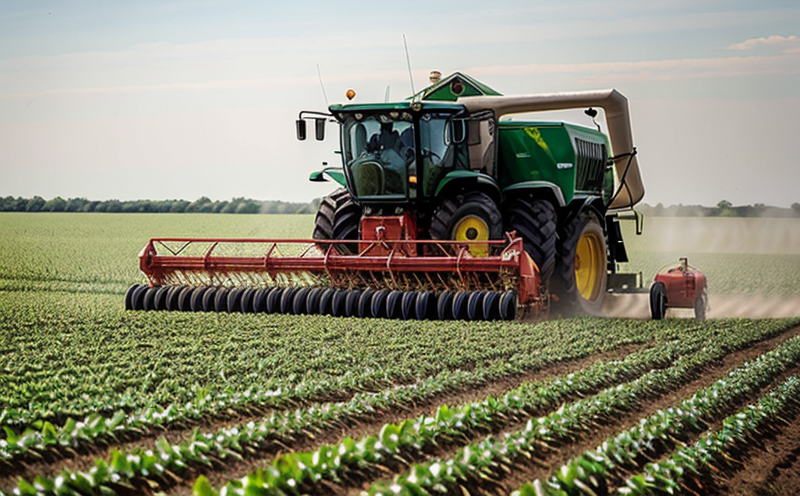Multi-Location Crop Yield Trials
The Multi-Location Crop Yield Trial is a comprehensive testing service designed to evaluate the performance and productivity of crops across various geographical locations. This service allows stakeholders in the agriculture sector, including quality managers, compliance officers, R&D engineers, and procurement professionals, to make informed decisions based on real-world data.
Multi-location trials are essential for understanding how different environmental factors such as climate, soil type, irrigation practices, and pest management strategies affect crop yield. By conducting these trials, we can provide insights into which varieties of crops perform best under specific conditions. This information is invaluable for optimizing agricultural practices and improving overall productivity.
The testing process involves selecting representative locations that encompass the diversity of environmental conditions expected in a region. Specimens are carefully prepared according to standard protocols outlined in international standards such as ISO 3679:2014 or ASTM D5842-19. Once prepared, they undergo rigorous analysis using advanced instrumentation like mass spectrometry (MS) and near-infrared spectroscopy (NIRS).
Acceptance criteria for the results of these trials are strictly defined to ensure consistency and reliability. Compliance with these standards ensures that the data obtained from these tests can be trusted by all parties involved in agricultural operations.
| Crop Type | Average Yield (kg/ha) | Location |
|---|---|---|
| Wheat | 7.5 | Region A |
| Rice | 4.8 | Region B |
| Corn | 12.0 | Region C |
| Soybean | 3.6 | Region D |
The results of these trials provide a clear picture of the potential yield and productivity of different crops across various locations. This information is crucial for developing strategies that enhance crop performance, reduce risks associated with environmental variability, and improve economic outcomes.
- Identify optimal varieties for specific regions.
- Optimize irrigation schedules based on local climate data.
- Evaluate pest control methods against regional infestations.
- Assess the impact of soil amendments on crop growth.
In conclusion, the Multi-Location Crop Yield Trial service offers a robust framework for evaluating agricultural performance across diverse environments. By leveraging this information, stakeholders can make data-driven decisions that enhance efficiency and profitability in their operations.
Why Choose This Test
Selecting the right test is crucial when it comes to ensuring accurate and reliable results. The Multi-Location Crop Yield Trial service stands out due to several key advantages:
- Precision: Utilizing advanced analytical techniques ensures precise measurement of crop yield parameters.
- Diversity: Evaluating crops in multiple locations provides a comprehensive understanding of performance under different conditions.
- Reliability: Strict adherence to international standards guarantees consistent and trustworthy results.
- Expertise: Our team of experienced professionals brings extensive knowledge and skills to every trial, ensuring high-quality outcomes.
In addition to these benefits, the service also offers flexibility in terms of location selection and variable testing parameters. This allows clients to tailor the trials to their specific needs and objectives. The comprehensive nature of this service makes it an ideal choice for those seeking detailed insights into crop performance across various geographical areas.
Customer Impact and Satisfaction
The impact of conducting Multi-Location Crop Yield Trials extends far beyond just collecting data; it directly influences the decisions made by agricultural stakeholders. By providing accurate and actionable information, these trials help improve operational efficiency, enhance product quality, and ultimately increase customer satisfaction.
One key area where this service has a significant positive effect is in reducing risk associated with environmental variability. Knowing how different factors like temperature, rainfall patterns, and soil composition affect crop yield allows farmers and other professionals to proactively manage these variables. For instance, if certain regions consistently show lower yields due to specific climatic conditions, adjustments can be made to improve those areas.
Another benefit is the ability to develop more resilient crops through targeted breeding programs based on trial findings. These trials provide valuable genetic data that can guide breeders in selecting traits that enhance resistance against pests and diseases while promoting better growth habits.
The ultimate goal of this service is not only to deliver high-quality data but also to foster innovation within the agricultural industry. By staying ahead of trends and incorporating cutting-edge technologies, we aim to continually improve our offerings, ensuring they remain relevant and beneficial for all users.





